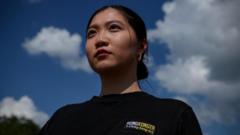With the federal elections approaching in Canada, Joe Tay, a Conservative candidate running in the Don Valley North district, finds himself in an unprecedented situation. Just as he is vying for a seat in Parliament, the Chinese government has placed a bounty of $130,000 on his head and has issued a warrant for his arrest. This journey into politics has been overshadowed by fear for his safety, leading him to run one of the quietest campaigns of all candidates.
Tay has not attended traditional campaign events such as door-to-door canvassing or public gatherings, a stark contrast to typical electoral strategies. Instead, Tay has chosen to focus on online outreach and media appearances to communicate with voters, aware of the risks posed by his vocal criticisms of the Chinese regime and their influence over Hong Kong's democratic freedoms.
In a worrying development for Tay's campaign, Canadian intelligence officials disclosed that he has been the target of a series of coordinated online attacks orchestrated by entities linked to the Chinese government. The aim of these attacks appears to be twofold: to discredit Tay by branding him a criminal and to undermine his visibility as a candidate, particularly in an electoral district with a substantial Chinese-Canadian community.
"There's a narrative being amplified by the P.R.C. government," highlighted Vanessa Lloyd, the head of Canada's intelligence agency, during a recent press conference, emphasizing the extent of manipulation occurring in the electoral space.
As election day draws near, the unfolding circumstances paint a complex picture of political competition, as Tay bravely moves forward in a contest where external pressures and threats make the stakes exceedingly high. The outcome in Don Valley North, one of Canada's most densely populated voting regions, could ultimately decide not only the local race but send ripples through the broader political landscape.
Tay has not attended traditional campaign events such as door-to-door canvassing or public gatherings, a stark contrast to typical electoral strategies. Instead, Tay has chosen to focus on online outreach and media appearances to communicate with voters, aware of the risks posed by his vocal criticisms of the Chinese regime and their influence over Hong Kong's democratic freedoms.
In a worrying development for Tay's campaign, Canadian intelligence officials disclosed that he has been the target of a series of coordinated online attacks orchestrated by entities linked to the Chinese government. The aim of these attacks appears to be twofold: to discredit Tay by branding him a criminal and to undermine his visibility as a candidate, particularly in an electoral district with a substantial Chinese-Canadian community.
"There's a narrative being amplified by the P.R.C. government," highlighted Vanessa Lloyd, the head of Canada's intelligence agency, during a recent press conference, emphasizing the extent of manipulation occurring in the electoral space.
As election day draws near, the unfolding circumstances paint a complex picture of political competition, as Tay bravely moves forward in a contest where external pressures and threats make the stakes exceedingly high. The outcome in Don Valley North, one of Canada's most densely populated voting regions, could ultimately decide not only the local race but send ripples through the broader political landscape.


















